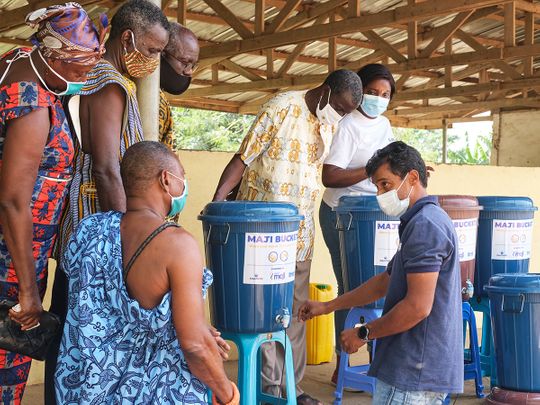
Dubai: When Sunil Lalvani saw two young Ghanaian children drinking from a roadside puddle, he was shaken. The now Dubai-based entrepreneur was moved to found the non-governmental organisation (NGO) Project Maji, which delivers safe drinking water in rural Sub-Saharan Africa.
Six years on, his initiative provides safe drinking water to more than 60,000 people.
When COVID-19 spread like wildfire and doctors recommended hand hygiene as a safeguard against infection, Lalvani was struck again by the dearth of basics that could cost an innocent life: the absence of soap and water. He came up with the Maji Bucket solution, which will be showcased at Expo 2020 Dubai as part of the Global Best Practice Programme.
Lalvani, in an interview with Gulf News, said of the recognition: “We hope that being part of Expo 2020 will open up new doors, helping introduce us to like-minded partners with the right skillsets, so we can expand our footprint."
What is the Maji Bucket?
In light of the coronavirus outbreak last year, Expo 2020’s Global Best Practice Programme announced a new stream of social proposals that would improve the lives of those affected by the health crisis. One of these is the Maji Bucket.
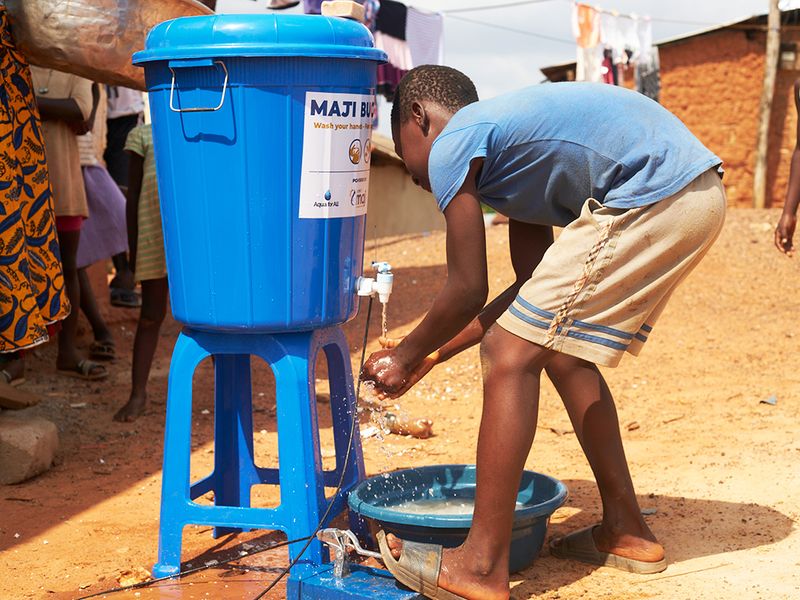
The Maji Bucket, which draws its name from ‘maji’ meaning ‘water’ in Swahili, is the charity’s own COVID-19 solution aimed at curbing the spread of bacteria by delivering safe hand hygiene practices.
“We are very proud of our COVID-19 solution, the Maji Bucket, which has been designed to have its parts easily sourced and be simply assembled across the African continent by communities that require cost-efficient, simple and effective handwashing solutions,” said Lalvani.
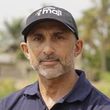
We are very proud of our COVID-19 solution, the Maji Bucket, which has been designed to have its parts easily sourced and be simply assembled across the African continent by communities that require cost-efficient, simple and effective handwashing solutions. With this in mind, being selected to join Expo 2020’s Global Best Practice Programme helps us bring global visibility to this grassroots innovation, designed to be shared worldwide in local communities who do not have access to hand hygiene essentials.
Invented by the NGO’s Ghanaian team, the blue plastic bucket makes for a low-tech handwashing station that keeps touchpoints to a minimum with its pedal-operated tap. Locally sourced raw materials have also helped create jobs in the communities, especially for people of determination at Ghana Federation of Disability Organisations, who are in charge of assembling the buckets.
Distribution of the buckets come with bars of soap and handwashing trainings; so far 75,000 people across Maji’s Ghana communities have had lessons.
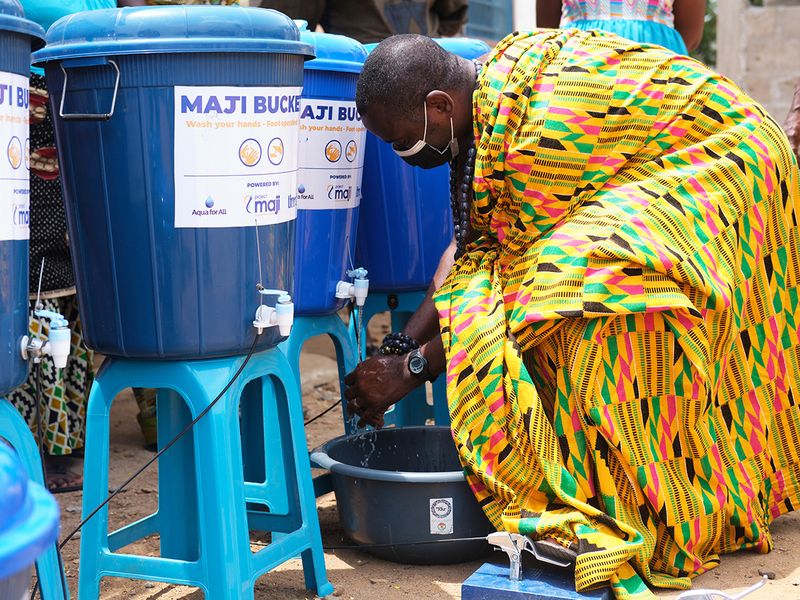
“We want as many people as possible to embrace and use the Maji Bucket. With this in mind, being selected to join Expo 2020’s Global Best Practice Programme helps us bring global visibility to this grassroots innovation, designed to be shared worldwide in local communities who do not have access to hand hygiene essentials.”
Even in the midst of a pandemic, teams in Ghana and Kenya never lost sight of the Maji purpose. While supply-chain restrictions and nationwide lockdowns deterred operations, Maji teams were busy securing special permissions to supply clean water on humanitarian grounds.
Dubai as a global hub for operations
Project Maji was born from a corporate social responsibility project launched by the British-Hong Kong electronics company Binatone – Lalvani’s family business. Using Binatone’s strong foothold in Ghana, Maji grew quickly in the region, expanding to Kenya with current plans of bringing clean water to Togo, Uganda and Rwanda next.
75,000
the number of people Maji Bucket has helped
Despite operating in Africa, the charity is based in Dubai. “With the emirate extremely well connected to the continent by air, we are able to build a top-quality organisation in Dubai that can effectively manage operations across multiple countries,” explained Lalvani.
Expo 2020 Dubai’s global platform affords Lalvani and his team the opportunity to connect with potential partners as a Dubai-based entity, while allowing them to be a part of the UAE’s meaningful journey.
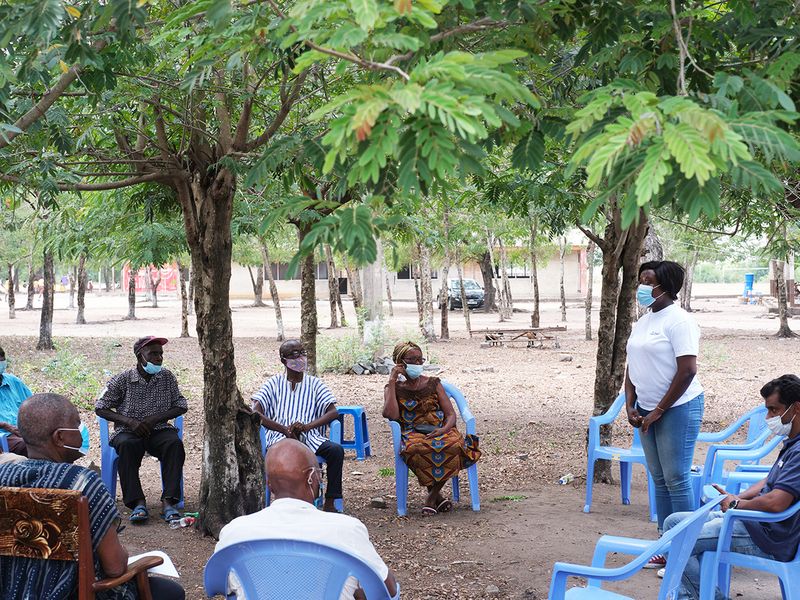
Using renewable resources
Maji's fundamental work is to ensure access to safe water across rural Africa, and it does this by building self-sufficient water kiosks.
It differs from water charities that build hand pumps, a default band-aid solution, in remote villages to battle the water crisis. Often left to rust due to lack of maintenance funds, hand pumps fail to offer a sustainable, long-term solution.
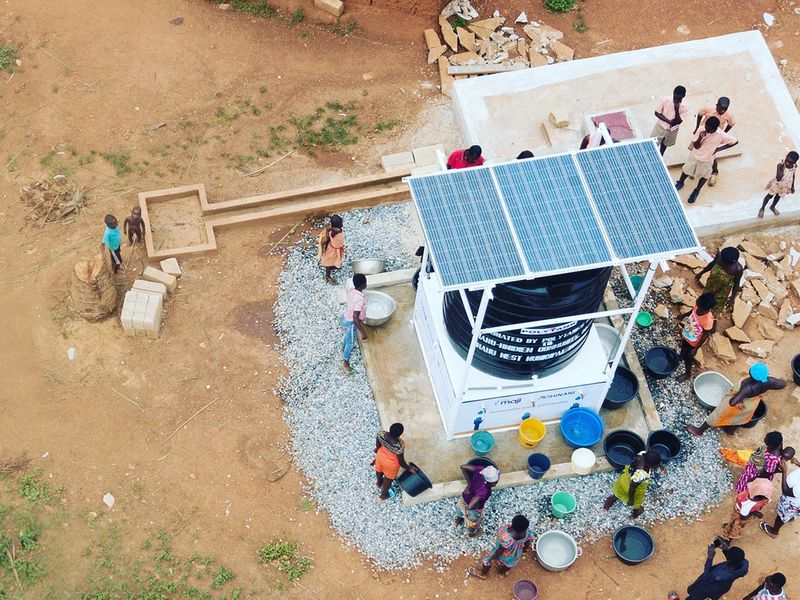
Lalvani’s entrepreneurial expertise helped Project Maji establish a niche through its cluster approach, making its key product, the solar-powered water kiosks, financially viable and sustainable. The social-enterprise model adopted by the project connects water kiosks, each with a tank capacity of 5,000 litres per day, in remote communities so that they can share a single solar-power and water source.
“The cluster approach makes it cost-efficient for us to build and operate sites, with our engineers able to be in one particular geography and cover more sites in a single visit,” said Lalvani. “Not only does this help bring down operating costs but it also makes us more accessible in terms of pricing for the customer, ensuring the financial sustainability for each of our kiosks.”
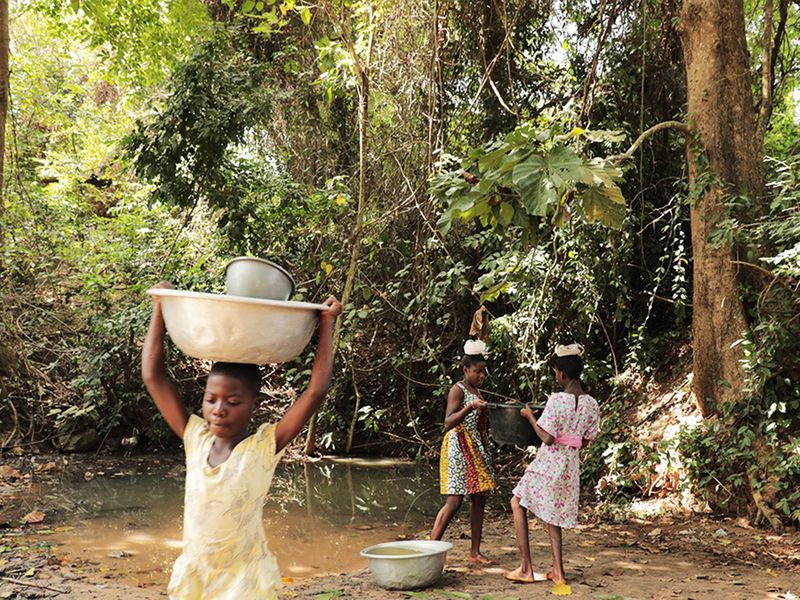
How does the kiosk work?
Project Maji kiosks are roofed with solar panel arrays that have a dust- and waterproof-rating of International Protection 67. These panels gather enough solar energy to pump water from aquifers, an underground porous rock layer saturated with groundwater, without over-abstraction.
“I think we are effective on many levels because we have set sustainability as a cross-cutting objective,” he remarked. Not only are the tanks non-polluting, but they also incur zero energy-related costs compared to pumps that rely on electrical grids and fuel.
Safe water for one million people by year 2025
Expansion across Africa and into other countries remains at the forefront of the Maji plan because the charity has a crucial benchmark to meet.
”We have a goal of serving one million people with sustainable access to safe water by the year 2025,” added Lalvani. “Our ultimate goal is to continue our work until the global water crisis is completely alleviated. We hope that Project Maji will play a key role in that process, buoyed by the support of Expo 2020 and the Global Best Practice Programme.”

We have a goal of serving one million people with sustainable access to safe water by the year 2025. Our ultimate goal is to continue our work until the global water crisis is completely alleviated. We hope that Project Maji will play a key role in that process, buoyed by the support of Expo 2020 and the Global Best Practice Programme.
Expo 2020’s Global Best Practice Programme will display 50 best practice projects from 39 different countries at the Best Practice Area in the Opportunity Pavilion during the event run.
The programme looks to solve some of the world’s biggest challenges, including those laid out by the United Nation’s 2030 Agenda for Sustainable Development, one of them being ‘Clean Water and Sanitation’.
- The writer is an intern at Gulf News.


